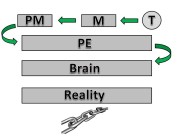Read Part 1 here

Someone’s brain thought this was a good idea.
Keep in mind that your brain’s task is to survive the moment, not the long-term. Without fail, the automatic behaviors that our brain engages in are accomplishing this task. However, due to its lack of perspective, the brain does not have the ability to coordinate momentary survival with long-term survival. So when your brain is acting, thinking, and feeling on your behalf, what does it think is happening? When we experience automatic behavioral responses, what is the brain trying to tell us?
Think of the following example. The next time you feel an itch on your skin (which will be fairly soon, given that I have now invited you to think about it), try to physically look at the area of your skin that is itchy but DO NOT ITCH IT! Just look at the itchy place. If you can’t physically see it, try to visualize it in your mind as vividly as possible. You may even want to visualize yourself itching it. I can almost guarantee that devoid of any foreign substance interference, if the itch is generated by your brain, looking at it alone will be sufficient intervention to remove it. Give it a try.

Squirrels – not known for their impulse control… or listening skills.
How does it work? Think of what we have talked about so far. The brain is trying to tell you something. It’s trying to tell you to pay attention to that part of your body, for some reason. If we try to block it out by distracting ourselves, the itch will only grow stronger until we are compelled to act on it. However, if we listen to what the brain is trying to tell us (“Hey! Look at this itchy spot on your nose!) and communicate to our brain that we have, in fact, listened, its job is done and it can move on to other things.
Think of how this can be applied to real-life problems. If you are bothered by recurring thoughts or concerns, instead of trying to distract yourself from them, listen to them. People are afraid to open this door to their brain, believing that they may not be able to close it again. However, opening the door and taking a compassionate inventory of what is inside will go much further than pretending the door doesn’t exist or buying an extra-reinforcing lock for it.

Is your brain confused or confusing?
When I say “listen” to your brain, what do I mean? Think about when you feel listened to by someone else (hopefully you have had that experience). Someone who listens does not respond immediately with “yeah, but…”. As a matter of fact, someone who listens may not make any verbal response at all. Someone who listens will resist the urge to jump in and solve your problems, to point out your errors, or to join the bandwagon of pain and negativity. The process of truly listening to another person, of communicating our desire to understand their experience and communicating that they have every right to their experience, is called validating. Even though we may not use the term, chances are we all know when we have been validated and when we haven’t. At least our brains do, deep down. And that is where we are going next.


















































Recent Comments